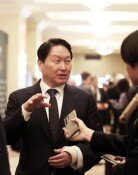[Editorial] Police reshuffle shows regional bias
[Editorial] Police reshuffle shows regional bias
Posted December. 07, 2000 15:00,
There are rising concerns about the national situation. The consensus of the popular opinion is that the nation is faced with a total crisis. The political situation increasingly is disturbing, and the economic plight is ever deteriorating.
Hence, the people are sustaining weary and unstable lives. At this moment, some lawmakers in the ruling camp came to recommend to President Kim Dae-Jung an across-the-board reform in state affairs.
There could be many factors that have led to a national crisis. But the most convincing reason for it is that the government failed to achieve national unity, more specifically its failure in realizing the east-west reconciliation or between the Yongnam and Honam provinces.
Since the inauguration of the "government of the people" in 1998, President Kim repeatedly emphasized regional reconciliation. On some occasions, he expressed his anguish about the regional antagonism. However, he was unable to make a breakthrough in regionalism, but rather the gap of their complications has been widened. The reason is simple. The fairness of the government's personnel administration has been heretofore questioned and has become a main factor stirring up the provincial antipathy.
In this vein, it is hard to understand the reshuffle of the senior officials that was conducted a couple of days ago. For instance, in the shakeup, Lee Young-Moo, national police director general, who hails from Chonju, North Cholla Province, was retained, while Park Kum-Sung, Kyonggi police director, from Yongam, South Cholla Province, was designated as the director of the Seoul Metropolitan Police Bureau. For the first time in the police history, personalities from Cholla or Honam provinces have taken the nation's two core police posts.
Director Park was promoted to the rank of superintendent general in March 1998, again promoted to the rank of senior superintendent general in one year and eight months, and recently took the second-highest police position in only one year. His fast promotion was ascribed to his capability, but allows much room for raising the fairness of the police personnel administration.
Already, speculation has it that Park will become the director general of the national police sooner or later.
What's more, the directorship of the intelligence bureau of the National Police Administration has been maintained by the officials. And in the latest reshuffle, promoted to the rank of senior superintendent general are three hailing from Honam, two from Yongnam and one each from Kyonggi, Kangwon and Chungchong provinces.
Whenever prejudicial personnel appointments were raised, the government protested that the changes were designed to rectify the lopsided police appointments in favor of the Yongnam provinces. And it used to add that, overall, there are more Yongnam police officers than those from Honam.
But this logic stands little reason. The point at question is who occupies the important or powerful posts. The "powerful" posts not only in Chong Wa Dae and the central government, but also prosecution, police, National Intelligence Service, National Tax Service, police and the military are mostly filled by Honam residents. This is why public criticism has been directed against the Kim government's unfair and prejudicial personnel administration.
In this regard, it is a concern that President Kim will keep up this sort of personnel appointment pattern for the coming days, for fears of the possible lame-duck syndrome with his presidential term nearing an end. To be stressed here that in order to achieve a genuine national harmony, the president will have to conduct personnel administration in conformity with public opinion and common sense.







